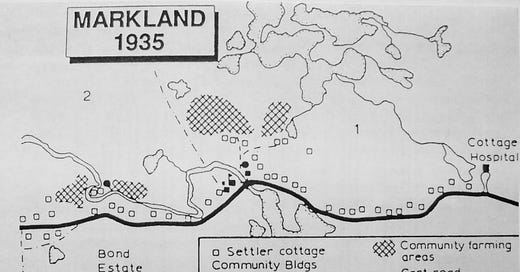When people think of Newfoundland, they picture ocean spray and broken-down boats, not wheat fields and cattle. Farming never took root in our cultural imagination the way fishing did. Maybe that’s because the land had other plans. Maybe because every time someone tried to grow something here, something darker took hold.
This isn’t just about agriculture. It’s about forgotten women, vanished money, secret Cold War farms, and a utopia that was promised—and buried.
Markland: The Utopia That Died in the Woods
In 1934, the Commission of Government launched a radical idea: move destitute city families to the woods near Whitbourne and turn them into self-sufficient farmers. They called it Markland. It was supposed to be a new beginning.
They were given tools, a patch of land, and a dream. But dreams don’t grow in clay and cold.
Most had never farmed a day in their life. Livestock died. Crops failed. People argued. There were whispers of drunken fights and stolen animals. A few years in, they started disappearing back to St John’s, ashamed and bitter. Some said the government siphoned money away. Others just stayed silent and tried to survive.
By the 1950s, the forest had reclaimed it all.
Keep reading with a 7-day free trial
Subscribe to The Newfoundland History Sleuth to keep reading this post and get 7 days of free access to the full post archives.




